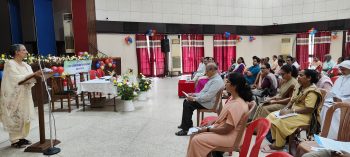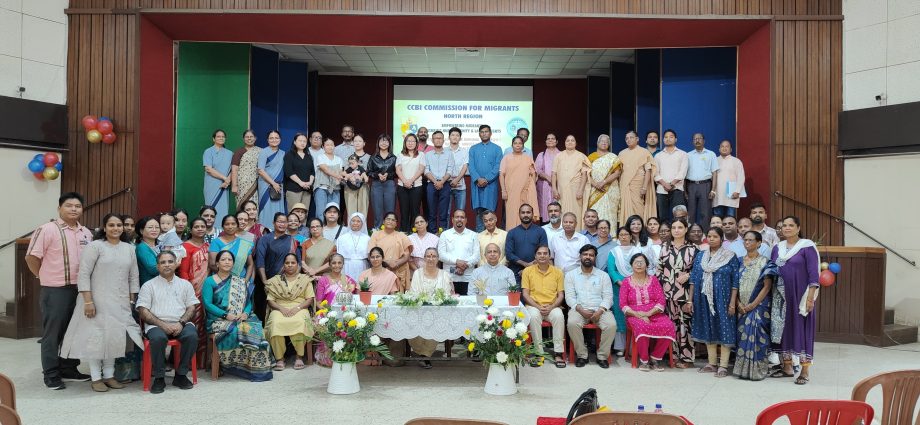BY Rani Punnasserril
New Delhi, Aug 14, 2024: India is heading for great social unrest and increased inequality if the country fails to address the rising unemployment and worsening poverty, warns a leading trade unionist.
“The gap between the rich and the poor is growing, and our youth are being pushed into despair,” Amarjeet Kaur, the national general secretary of the All India Trade Union Congress, told a seminar on empowering migrants in New Delhi.
As many as 65 people working among migrants, internally displaced and unorganized workers attended the August 12 seminary at the Diocesan Community Centre attached to the Archbishop’s House.
The seminar organized by the northern region of the Conference of Catholic Bishops of India Commission for Migrants, aimed at empowering migrants by protecting their human dignity and labour rights.
It brought together voices from the labour and social justice sectors, to address the challenges faced by migrant workers in the region and explore potential solutions through dialogue and collaboration.
Kaur, who presented the keynote address, highlighted the tough realities faced by unorganized workers in India, especially the youth, who are dealing with rising unemployment and worsening poverty.
The 72-year-old trade unionist called for a strong and comprehensive policy framework to uplift unorganized workers and migrants. She also stressed that the government must focus on creating equal opportunities for everyone, ensuring that economic growth does not leave behind the most vulnerable.

Archbishop Anil Couto of Delhi, in his inaugural speech, said the seminar was a crucial step towards understanding and addressing the issues faced by migrant workers in northern India. He stressed the importance of solidarity and collective action in finding sustainable solutions to improve the lives of migrant workers.
Archbishop Couto also highlighted the need for collaboration between different stakeholders to advocate for policies that protect the rights and dignity of migrant workers. He urged participants to work together towards creating a more inclusive society where migrant workers are valued and respected.
Father Jaison Vadassery, commission executive secretary, introduced the CCBI Mission 2033, a forward-looking pastoral plan that aligns with the Catholic Church’s broader mission of synodality—a concept that emphasizes people journeying together.
This plan, developed with the Jubilee Year 2033 in mind, focuses on the Church’s role in supporting migrants and unorganized workers, recognizing their struggles as a critical part of its mission to promote justice, dignity, and human rights.
Father Vadassery explained that the Mission 2033 plan is designed to address the long-term spiritual and social needs of migrants and not just their economic well-being. This holistic approach aims to create a more inclusive and supportive environment for migrants, encouraging dioceses across India to actively participate in this mission.
The seminar ended with a collaborative session where participants, including representatives from the dioceses of Jammu-Srinagar, Jalandhar, Shimla-Chandigarh, and Delhi, developed a concrete action plan.
The highlights of the plan:
1. Policy Advocacy: The need to push for stronger policies at the national level that protect the rights of migrant workers and unorganized labourers. This includes advocating for the full implementation of the E-shram portal, ensuring that workers not only register but also receive the benefits they are entitled to.
2. Strengthening Networks: Building stronger connections among dioceses and national organizations to provide better support and coordination for migrant workers. This involves setting up regular communication channels and collaborative platforms to share resources and strategies.
3. Awareness and Education: Enhancing efforts to educate workers about their rights and the resources available to them. The seminar stressed the importance of widespread awareness campaigns, especially in rural and remote areas, to ensure that every worker is informed and empowered.
4. Spiritual and Mental Well-being: Recognizing that the challenges faced by migrants are not just physical but also mental and spiritual, the action plan includes initiatives to provide pastoral care and psychological support. This will be facilitated through local Church communities and specialized programs aimed at addressing the unique needs of migrants.
The participants pledged to work together to create sustainable support systems and advocate for policy changes that prioritize the well-being of migrant workers in the region.
They agreed to meet again to review progress and refine their strategies. The seminar was part of the Church’s ongoing efforts to ensure that vulnerable members of society are supported and helped advance through both policy and pastoral care.
During the sharing session, participants from Manipur and Burmese refugees shared their heartrending testimonies and added a deep emotional dimension to the seminar, underscoring the urgent need for collective action to support these vulnerable communities.










